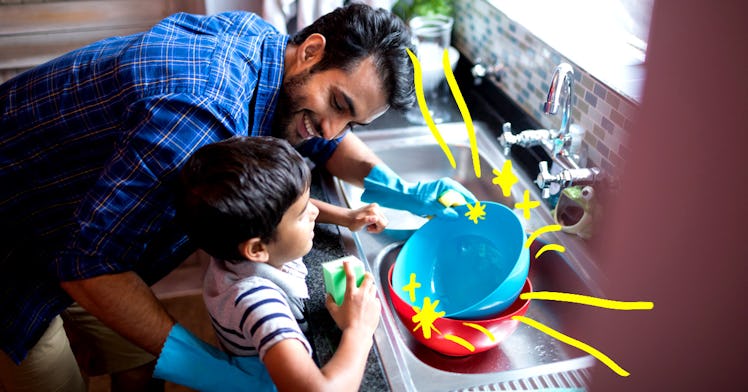More Chores Are Needed to Build Character in American Kids
The assumption that difficult and physical work breeds good values makes an ass of neither you nor me.

Chores for kids aren’t a uniquely American tradition, but the idea of discrete and articulated responsibilities is more heavily emphasized here than in many other countries. Why? Chore culture has been with us since the pilgrims, who heavily associate hard work with virtue and though child labor was a moral good. When the need for that labor decreased in the post-World War II era, the chores remained but the justification for them shifted. Instead of directly supporting the family, kids were understood to be building character. They were learning how to work. Today, chores less of a point of emphasis in heavily scheduled households, but still common and, research would suggest, good. It turns out the Pilgrims, who almost comically terrible parents by today’s standards, were right about something.
In order to understand how chores build character, it’s important to understand what we’re talking about when we talk about “character.” Character is tied to values and values shift based on influences like culture and religion, but cultural relativism doesn’t render the term gaseous. Family therapist Bette Levy Alkazian of Balanced Parenting offers a neat definition. “Character is the ability to know right from wrong and to act accordingly,” she says, adding that it is also a term generally associated with resilience.
Essentially, the thought is that by doing chores and physically hard work, kids will develop a sense of the value of what is given to them and the stick-to-itiveness to see projects through. But it’s not just about sweat equity. Positive effects are derived from both the process and the outcome, which is something parents often ignore.
“We help kids to develop character by giving them the space to fail…or succeed,” says Alkazain. “It’s so hard to watch our kids struggle, but if they never struggle, how will they ever learn how to get through tough things?”
Many parents believe that in order to build character, the work has to be somehow tedious or physically taxing — as if the character comes from the endurance of physical discomfort. That’s not the case. In fact, character-building tasks just need to be difficult. And depending on the child, that leaves a wide variety of chores or activities. Why? Kids can build confidence and learn from the experience of tackling a project they find hard. “Those experiences help a child build confidence that they can handle life on their own,” explains clinical psychologist Dr. Paul DePompo, founder of the Cognitive Behavioral Therapy Institute. “They grow to see themselves as strong and capable and building confidence that they can cope with life.”
DePompo notes that the type of character-building work a child is given should shift as they get older. Toddlers can dust shelves (poorly) and middle schoolers can work up to making their own lunches (with some oversight). The important catch: The chore assignment process should remain static. “Show them how to do it, do it with them, then have them do it on their own,” says DePompo. “Most of all even though you think you praise your child, surgically increase the specific praise of these traits you want to see when you see them in action.”
That means it’s not enough to say “good job.” That isn’t a description of what happened that was positive. Parents should go with something along the lines of… “I saw you wanted to stop but you kept going and your perseverance is amazing.” It might sound stilted coming out, but it will help.
“Direct coaching is a great way to support a child in acquiring these qualities,” explains parenting coach Elisabeth Stitt. “When a child is tired and wants to give up, the parent offers empathy — ‘I don’t blame you for being tired’ — praise for effort — ‘You have been working so hard on this equation’ — and encouragement.”
Stitt explains that while it’s true the activity could be anything it does help when the chore is physical. That sense of movement is important. “One of the reasons that physical challenges or chores are particularly effective is that most children are first and foremost kinesthetic learners and doing something concrete makes solidifies their learning and sense of satisfaction,” she says.
So, while it’s not necessary for kids to clean out the shed to build character, it is important that they struggle to help around the house a little bit. And chores? They pretty much work as long as parents are studious about setting stretch goals.